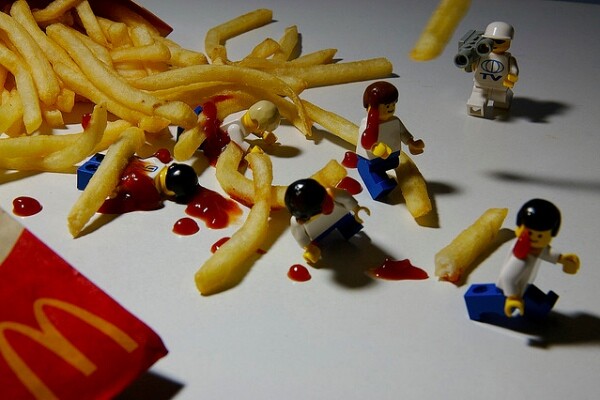Fast Food Strikes Set To Get More Heated

When the fast food strikes began way back in November of 2012, few thought they'd still be happening nearly two years later. While protest leaders have continually stressed looking at the strikes as part of a long-term fight that will take years, in this day and age of instant gratification, onlookers and corporate heads alike believed everything would quiet down after workers got it out of their system.
It hasn't quieted down. In fact, it's only gotten louder.
This Thursday marks another large-scale planned protest by fast food workers, and it's set to be the biggest to date with workers in over 150 American cities taking part. But more important than the size, this round also brings with it a shift in tone. There's the possibility of police intervention for the first time:
"They're going to use nonviolent civil disobedience as a way to call attention to what they're facing," said Mary Kay Henry, president of the Service Employees International Union, which has spent millions of dollars helping to underwrite the campaign. "They're invoking civil rights history to make the case that these jobs ought to be paid $15 and the companies ought to recognize a union."
Or as one protestor more powerfully put it:
"On Thursday, we are prepared to take arrests to show our commitment to the growing fight for $15," said Terrence Wise, a Burger King employee in Kansas City, Mo., and a member of the fast-food workers' national organizing committee.
"Prepared to take arrests" isn't the relatively calm discourse that's been on display so far, which has felt more like workers simply taking an unplanned day off from work before showing up the next day as if nothing has happened. Instead, it's a bold statement this fight is moving onto the next phase.
This seems to echo the growing animosity between workers and bosses that's been on display recently. In March, workers from across the country launched a series of lawsuits against McDonald's claiming "wage theft." A few weeks ago, fast food workers in California scored a big victory with the passage of a bill that grants more rights to franchise owners. And in a Labor Day speech in Milwaukee, President Obama mentioned the fast food worker campaign, particularly how they should continue their attempt to unionize.
Perhaps due to workers scoring these minor victories, rhetoric and actions have been escalating since the last batch of protests. For example, last week an Oakland Jack in the Box restaurant was the site of a small protest after two workers were allegedly fired for signing union cards.
Local freelance reporter Darwin BondGraham was on the scene:
WalMart worker & activist Dom outside Jack In the Box where 2 workers were allegedly fired for signing union cards pic.twitter.com/AM3uSQImaN
— Darwin BondGraham (@DarwinBondGraha) August 30, 2014
Supporters of fired Jack In the Box workers protested inside Jack In the Box today. Management did not meet with them pic.twitter.com/TeLsYTy5sk
— Darwin BondGraham (@DarwinBondGraha) August 30, 2014
As the fight continues to escalate, small scenes like this may play out more often. And they'll be influenced by the tone of the big protests, like the one planned on Thursday. Meaning, whatever happens -- however many arrests are made and how far the measures of civil disobedience go -- will not disappear once Friday rolls around. Instead, it will set the stage for the next phase of the protest, whatever that may be.